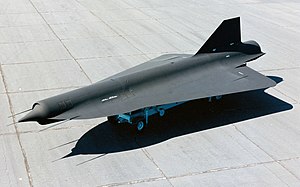| D-21 | |
|---|---|
 A D-21 on display at the United States Air Force National Museum | |
| General information | |
| Type | High-altitude and high speed reconnaissance drone |
| National origin | United States |
| Manufacturer | Lockheed |
| Primary users | Central Intelligence Agency |
| Number built | 38 |
| History | |
| Introduction date | 1969 |
| First flight | 22 December 1964 |
| Retired | 1971 |
The Lockheed D-21 is an American supersonic reconnaissance drone. The D-21 was initially designed to be launched from the back of an M-21 carrier aircraft, a variant of the Lockheed A-12 aircraft. The drone had maximum speed in excess of Mach 3.3 (2,200 miles per hour; 3,600 kilometers per hour) at an operational altitude of 90,000 feet (27,000 meters). Development began in October 1962. Originally known by the Lockheed designation Q-12, the drone was intended for reconnaissance deep into enemy airspace.
The D-21 was designed to carry a single high-resolution photographic camera over a preprogrammed path, then release the camera module into the air for retrieval, after which the drone would self-destruct.[1] Following a fatal accident when launched from an M-21, the D-21 was modified to be launched from a Boeing B-52 Stratofortress. Several successful test flights were made, followed by at least four unsuccessful operational D-21 flights over China, before the program was canceled in 1971.
- ^ Donald 2003, pp. 154–56.